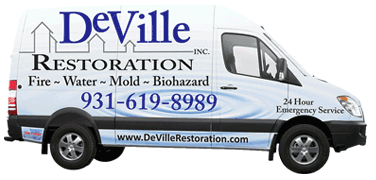What to do until help arrives. These emergency tips will assist you in taking the proper action until your Deville Restoration Professional arrives. Follow these Do’s and Don’ts to reduce damage and increase the chances of a successful restoration.
Fire & Smoke Damage
Do:
- Limit movement in the home to prevent soot particles from being embedded into upholstery and carpet.
- Keep hands clean. Soot on hands can further soil upholstery, walls and woodwork.
- Place dry, colorfast towels or old linens on rugs, upholstery and carpet traffic areas.
- If electricity is off, empty freezer and refrigerator completely and prop doors open to help prevent odor.
- Wipe soot from chrome on kitchen and bathroom faucets and appliances, then protect these surfaces with a light coating of lubricant.
- If heat is off during winter, pour RV antifreeze in sinks, toilet bowls, holding tanks and tubs to avoid freezing pipes and fixtures.
- Wash both sides of leaves on houseplants.
- Change HAC filter, but leave system off until a trained professional can check the system.
- Tape double layers of cheesecloth over air registers to stop particles of soot from getting in or out of the HVAC system.
Don’t:
- Attempt to wash any walls or painted surfaces without first contacting a Deville Restoration professional.
- Attempt to shampoo carpet or upholstered furniture without first consulting the Deville Restoration professionals.
- Attempt to clean any electrical appliances (TV sets, radios, etc.) that may have been close to fire, heat or water without first consulting an authorized repair service.
- Consume any food or beverages that may have been stored close to fire, heat or water. (They may be contaminated)
- Turn on ceiling fixtures if ceiling is wet. Wiring may be wet or damaged and cause electrical shock, and air movement may create secondary damage.
- Send garments to the dry cleaner. Improper cleaning may set smoke odor.
Water Damage from Clean Water
Do:
- Shut off the source of water if possible or contact a qualified party to stop the water source.
- Turn off circuit breakers for wet areas of the building, when access to the power distribution panel is safe from electrical shock
- Remove as much excess water as possible by mopping and blotting.
- Wipe excess water from wood furniture after removing lamps and tabletop items.
- Place aluminum foil or wood blocks between furniture legs and wet carpeting.
- Remove to a save, dry place any paintings, art objects, computers, documents and other materials that are valuable or sensitive to moisture.
- Use wooden clothespins to keep furniture skirting off damp floors.
- Hang draperies with coated hangers to avoid contact with wet carpeting or floors.
- Hang furs and leather goods to dry separately at room temperature.
Don’t:
- Enter rooms with standing water where electrical shock hazards may exist.
- Enter affected areas if electrical equipment are exposed to water. Always avoid electrical shock hazards.
- Leave books, newspapers, magazines or other colored items on wet carpets or floors to cause staining.
- Leave oriental rugs or other colored rugs on wet wall-to-wall carpets to cause staining.
- Use your household vacuum cleaner to remove water, possibly causing electrical shock or damage to the vacuum cleaner.
- Use TV’s or other appliances while standing on wet carpets or floors, especially not on wet concrete floors.
- Turn on ceiling fixtures if ceiling is wet or enter rooms where ceilings are sagging from retained water.
Water Damage from Contaminated Water
Do:
- Avoid all contact with sewage and items contaminated by sewage.
- Wash your hands thoroughly after contact with contaminated items.
Don’t:
- Spread contaminated water by walking unnecessarily on damaged or wet areas.
- Turn on the HVAC system if there is a possibility of spreading contaminated air.
- Use house hold fans to dry the structure and spread contaminants.
- Use products for personal hygiene and cleanliness if exposed t the contaminated areas.
Note: if exposed to harmful waste, OSHA recommends a post-exposure medical evaluation. Consult your local health department or physician.
Vandalism Damage
Do:
- Hose or wash egg damage from building exterior as soon as possible.
- Vacuum glass particles from carpets and upholstery.
- Save containers, which reveal the ingredients of spilled inks, cosmetics and paints.
Don’t:
- Attempt to remove ink, paint or cosmetic stains.
- Operate damaged lamps or appliances.
- Discard furniture wood chips, broken pieces from porcelain, furniture or art objects.
Harmful Waste (Sewage, Blood borne Pathogens, etc.)
Do:
- Stay our of affected areas.
- Call emergency service personnel if the situation is life threatening.
- Treat all bodily fluids as if they are contaminated.
Don’t:
- Attempt cleanup of any kind.
- Touch or handle items that might be contaminated with bodily fluids.









